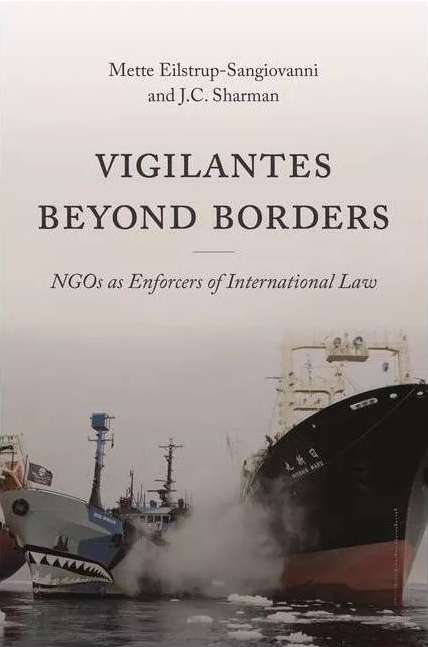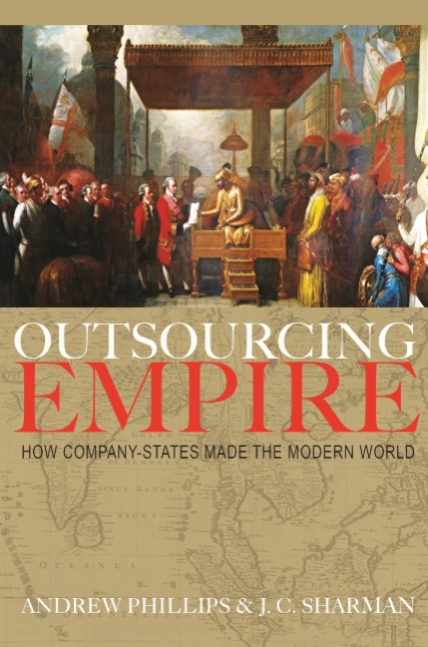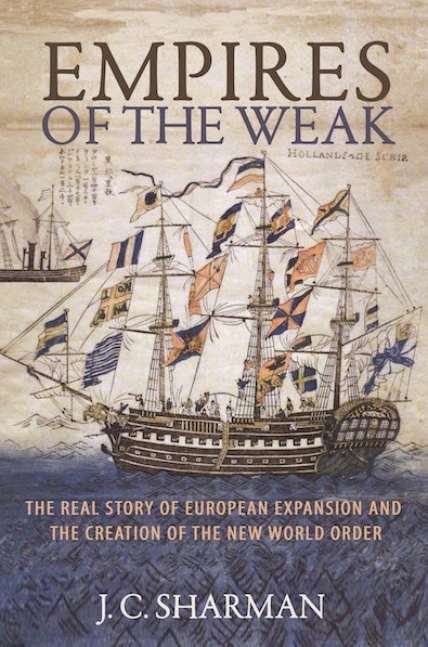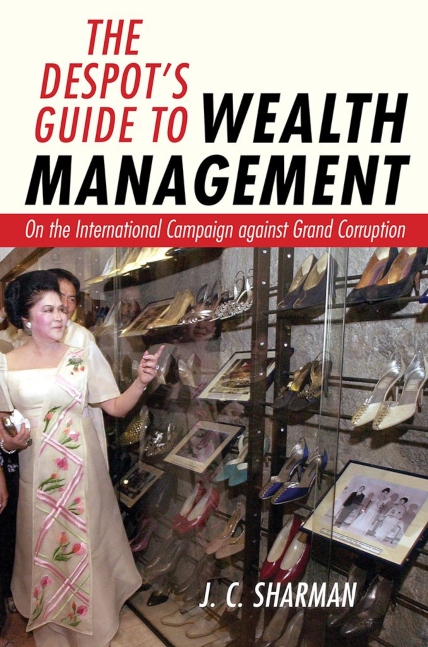Biography
Jason Sharman is the Sir Patrick Sheehy Professor of International Relations in the Department of Politics and International Studies at Cambridge. He received his PhD in political science from the University of Illinois at Urbana-Champaign in 1999, and his undergraduate degree in history and politics from the University of Western Australia.
Previously, Sharman worked at American University in Bulgaria, the University of Sydney and Griffith University, and he has spent shorter periods as a visitor at St Petersburg State University, Columbia University and the London School of Economics.
Sharman’s research is divided into two main streams. The first is focused on the global regulation of money laundering, corruption and tax havens. The second deals with the international relations of the early modern world and the historical evolution of the international system.
Aside from his academic research, Sharman has worked as a consultant with the World Bank, Asian Development Bank, Financial Action Task Force, Asia-Pacific Group on Money Laundering and with a variety of groups in the private sector.
Publications
Books
|
|
|
|
|
|
J.C. Sharman, Ties that Bound: Slavery and Power in Africa (Princeton: Princeton University Press, forthcoming 2026).
J.C. Sharman and Mette Eilstrup-Sangiovanni, Vigilantes Beyond Borders: NGOs as Enforcers of International Law (Princeton: Princeton University Press, 2022).
J.C. Sharman and Andrew Phillips, Outsourcing Empire: How Company-States shaped the Modern World (Princeton: Princeton University Press, 2020), 272 pages.
J.C. Sharman, Empires of the Weak: The Real Story of European Expansion and the Creation of the New World Order (Princeton: Princeton University Press, 2019), 201 pages.
J.C. Sharman, The Despot’s Guide to Wealth Management: On the International Campaign against Grand Corruption (Ithaca: Cornell University Press, 2017), 265 pages.
J.C. Sharman and Andrew Phillips, International Order in Diversity: War, Trade and Rule in the Indian Ocean (Cambridge: Cambridge University Press, 2015), 276 pages (Winner 2016 Jervis-Schroeder Award, American Political Science Association; Winner 2017 Francesco Guicciardini Prize for Best Book in Historical International Relations, International Studies Association).
J.C. Sharman, Michael G. Findley and Daniel L. Nielson, Global Shell Games: Experiments in Transnational Relations, Crime and Terrorism (Cambridge: Cambridge University Press, 2014), 250 pages (Winner 2015 Yale H. Ferguson Award, International Studies Association).
J.C. Sharman, The Money Laundry: Regulating Criminal Finance in the Global Economy (Ithaca: Cornell University Press, 2011), 224 pages.
J.C. Sharman, Emile van der Does de Willebois, Emily Halter, Robert A. Harrison and Ji Won Park. The Puppet Masters: How the Corrupt Use Legal Structures to Hide their Stolen Assets and What to do About It (Washington D.C.: World Bank, 2011), 268 pages.
J.C. Sharman and David Chaikin, Corruption and Money Laundering: A Symbiotic Relationship (New York: Palgrave, 2009), 234 pages.
J.C. Sharman and Percy S. Mistry, Considering the Consequences: The Development Implications of Initiatives on Taxation, Anti-Money Laundering and Combating the Financing of Terrorism (London: Commonwealth, 2008), 202 pages.
J.C. Sharman, Havens in a Storm: The Struggle for Global Tax Regulation (Ithaca: Cornell University Press, 2006), 211 pages.
J.C. Sharman, Repression and Resistance in Communist Europe (London: Routledge Curzon, 2003), 173 pages.
Refereed Articles
J.C. Sharman and Andrew Phillips, “Anarchy and Empire: World-Conquerors and International Systems,” International Studies Quarterly, forthcoming.
J.C. Sharman, Michael G. Findley and Daniel L. Nielson “Banking Bad? A Global Field Experiment on Risk, Reward, and Regulation,” American Journal of Political Science 69 (April 2025), 545-559.
J.C. Sharman, “Against Diffusion: Power and Institutions in African-European Relations,” International Studies Quarterly, Volume 68, Issue 2, June 2024, sqae029, https://doi.org/10.1093/isq/sqae029
J.C. Sharman and Ayşe Zarakol, “Global Slavery in the Making of States and International Orders,” American Political Science Review , Volume 118 , Issue 2 , May 2024 , pp. 802 - 814 https://doi.org/10.1017/S0003055423000424
J.C. Sharman, “Something New Out of Africa: States Made Slaves, Slaves Made States,” International Organization 77 (April 2023), 497-526.
J.C. Sharman and Mette Eilstrup-Sangiovanni, “Enforcers Beyond Borders: Transnational NGOs and the Enforcement of International Law,” Perspectives on Politics 19 (March 2021), 131-147.
- Winner Heinz I. Eulau Award, best article published in Perspectives on Politics 2021
J.C. Sharman and Andrew Phillips, “Company-States and the Creation of the Global International System,” European Journal of International Relations 26 (December 2020), 1249-1272.
J.C. Sharman, “Power and Profit at Sea: The Rise of the West in the Making of the International System,” International Security 43 (Spring 2019), 163-196
J.C. Sharman, “Myths of Military Revolution: European Expansion and Eurocentrism,” European Journal of International Relations 24 (September 2018), 491-513.
J.C. Sharman, Alexander Cooley and John Heathershaw, “The Rise of Kleptocracy: Laundering Cash, Whitewashing Reputations,” Journal of Democracy 29 (January 2018), 39-53.
J.C. Sharman, “Sovereignty at the Extremes: Micro-States in World Politics,” Political Studies 65 (October 2017).
J.C. Sharman and Alexander Cooley, “Transnational Corruption and the Globalized Individual,” Perspectives on Politics 15 (September 2017): 732-753.
J.C. Sharman, Michael Findley, Brock Laney and Daniel Nielson, “External Validity in Parallel Global Field and Survey Experiments on Anonymous Incorporation,” Journal of Politics 79 (Fall 2017), 856-872.
J.C. Sharman, Brent Allred, Daniel Nielson and Michael Findley, “Anonymous Shell Companies: A Global Audit Study and Field Experiment in 176 Countries,” Journal of International Business Studies 48 (July 2017), 596-619.
J.C. Sharman, “Illicit Global Wealth Chains after the Financial Crisis: Micro-States and an Unusual Suspect,” Review of International Political Economy 24 (No. 1 2017), 30-55.
J.C. Sharman and Jo-Anne Gilbert, “Turning a Blind Eye to Bribery: Explaining Failures to Comply with the International Anti-Corruption Regime,” Political Studies 64 (March 2016), 74-89.
J.C. Sharman and Andrew Phillips, “Explaining Durable Diversity in International Systems: State, Company and Empire in the Indian Ocean,” International Studies Quarterly 59 (September 2015), 436-448 (Winner 2016 Outstanding Article Award in International History and Politics, American Political Science Association).
J.C. Sharman and Carolin Liss, “Global Corporate Crime-Fighters: Private Transnational Responses to Piracy and Money Laundering,” Review of International Political Economy 22 (No.4 2015), 693-718.
J.C. Sharman, “War, Selection, and Micro-States: Economic and Sociological Perspectives on the International System,” European Journal of International Relations 21 (March 2015), 194-214.
J.C. Sharman, Michael G. Findley and Daniel L. Nielson, “Causes of Non-Compliance with International Law: A Field Experiment in Anonymous Incorporation,” American Journal of Political Science 59 (January 2015), 146-161.
J.C. Sharman and Alexander Cooley, “Blurring the Line between Licit and Illicit: Transnational Corruption Networks in Central Asia and Beyond,” Central Asian Survey 34 (No.1 2015), 11-28.
J.C. Sharman and Hun Joon Kim, “Accounts and Accountability: Corruption, Human Rights and Individual Accountability Norms,” International Organization 68 (May 2014), 417-448.
J.C. Sharman, Shima Baradaran, Michael G. Findley, and Daniel L. Nielson, “Funding Terror,” University of Pennsylvania Law Review 162 (February 2014), 477-536.
J.C. Sharman and Catherine Weaver, “RIPE, the American School, and Global Diversity in IPE,” Review of International Political Economy 20 (December 2013), 1082-1100.
J.C. Sharman, Michael G. Findley, and Daniel L. Nielson, “Using Field Experiments in International Relations: A Randomized Study of Anonymous Incorporation,” International Organization 67 (October 2013), 657-693.
J.C. Sharman, “International Hierarchy and Contemporary Imperial Governance: A Tale of Three Kingdoms,” European Journal of International Relations 19 (June 2013), 189-207.
J.C. Sharman, Shima Baradaran, Michael G. Findley, and Daniel L. Nielson, “Does International Law Matter?” Minnesota Law Review 97 (February 2013), 745-837.
J.C. Sharman and Catherine Weaver, “Between the Covers: International Relations in Books,” PS: Political Science and Politics 46 (January 2013), 124-128.
J.C. Sharman, “Canaries in the Coal Mine: Tax Havens, the Decline of the West and the Rise of the Rest,” New Political Economy 17 (October 2012), 493-513.
J.C. Sharman, “Chinese Capital Flows and Offshore Financial Centres,” Pacific Review 25 (July 2012), 317-337.
J.C. Sharman, “Seeing Like the OECD on Tax,” New Political Economy 17 (February 2012), 17-33.
J.C. Sharman, “Testing the Global Financial Transparency Regime,” International Studies Quarterly 54 (December 2011), 981-1001.
J.C. Sharman and Jacqui True, “Anglo-American Followers or Antipodean Iconoclasts? The 2008 TRIP Survey of Australia and New Zealand,” Australian Journal of International Affairs 65 (April 2011), 143-161.
J.C. Sharman, “Shopping for Anonymous Shell Companies: An Audit Study of Financial Anonymity and Crime,” Journal of Economic Perspectives 24 (Fall 2010), 127-140.
J.C. Sharman, “Dysfunctional Policy Transfer and National Tax Blacklists,” Governance 23 (October 2010), 623-639.
J.C. Sharman, “Offshore and the New Political Economy,” Review of International Political Economy 17 (January 2010), 1-19.
J.C. Sharman, “Privacy as Roguery: Personal Financial Information in an Age of Transparency,” Public Administration 87 (December 2009), 717-731.
J.C. Sharman, “The Bark is the Bite: International Organizations and Blacklisting,” Review of International Political Economy 16 (December 2009), 573-596. [Republished in Money Laundering edited by Navin Beekarry (Cheltenham: Edward Elgar, 2012)].
J.C. Sharman and Patrick Weller, “Where is the Quality? Political Science Scholarship in Australia,” Australian Journal of Political Science 44 (December 2009) 597-612.
J.C. Sharman and David Marsh, “Policy Diffusion and Policy Transfer,” Policy Studies 30 (June 2009), 269-289.
J.C. Sharman and David Chaikin, “Corruption and Anti-Money Laundering Systems: Putting a Luxury Good to Work,” Governance 22 (January 2009), 27-45.
J.C. Sharman, “Benchmarking Australian IR: Low Impact, a Bookish Lot, or a Very British Affair?” Australian Journal of International Affairs 62 (December 2008), 529-540.
J.C. Sharman, “Regional Deals and the Global Imperative: The External Dimension of the European Union Savings Tax Directive,” Journal of Common Market Studies 46 (November 2008), 1049-1069.
J.C. Sharman, “Power, Discourse and Policy Diffusion: Anti-Money Laundering in Developing States,” International Studies Quarterly 52 (September 2008), 635-656.
J.C. Sharman and Carla Wilshire, “Fighting Plagiarism in Australian Universities: Why Bother?” Australian Journal of Political Science 42 (September 2007), 503-508.
J.C. Sharman, “Rationalist and Constructivist Perspectives on Reputation,” Political Studies 55 (March 2007), 20-37.
J.C. Sharman, “Norms, Coercion and Contracting in the Struggle against ‘Harmful’ Tax Competition,” Australian Journal of International Affairs 60 (March 2006), 143-169.
J.C. Sharman, “South Pacific Tax Havens: Leaders in the Race to the Bottom or Laggards in the Race to the Top?” Accounting Forum 29 (September 2005), 311-323.
J.C. Sharman and John M. Hobson, “The Enduring Place of Hierarchy in World Politics: Tracing the Social Logics of Hierarchy and Political Change,” European Journal of International Relations 11 (March 2005), 63-98.
J.C. Sharman, “Who Pays for Entering Europe? Sectoral Politics and European Union Accession,” European Journal of Political Research 43 (October 2004), 797-821.
J.C. Sharman and Robert Phillips, Jr, “An Internalist Perspective on Party Consolidation and the Bulgarian Union of Democratic Forces,” European Journal of Political Research 43 (May 2004), 397-420.
J.C. Sharman, “Agrarian Politics in Eastern Europe in the Shadow of EU Accession,” European Union Politics 4 (December 2003), 447-472.
J.C. Sharman, “Culture, Strategy and State-Centered Explanations of Revolution, 1789 and 1989,” Social Science History 27 (Spring 2003), 1-24.
J.C. Sharman and Dexter S. Boniface, “An Analytic Revolution in Comparative Politics?” Comparative Politics 33 (July 2001), 475-495.
J.C. Sharman, “New Conceptions of Peasant Resistance to Collectivization,” Soviet and Post-Soviet Review 27:2 (2000), 241-259.
J.C. Sharman and Roger E. Kanet, “The Challenge of Democratic Consolidation in Post-Communist Europe,” International Politics 35 (September 1998), 333-351.
J.C. Sharman, “Vorhersage und Vergleich. Zur Osteuropaforschung in den USA [Prediction and Comparison in the Study of Eastern Europe in the USA],” Osteuropa 48 (August-September 1998), 821-837.
J.C. Sharman, “Post-Communist State Building and the Nagorno-Karabakh Conflict,” Soviet and Post-Soviet Review 23:3 (1996), 329-347.





